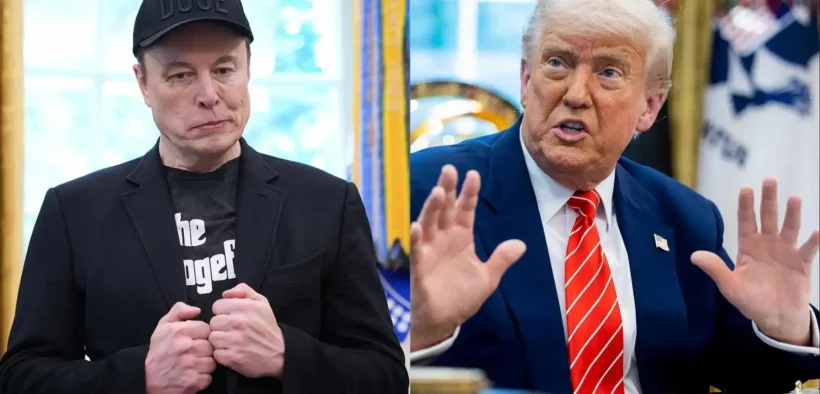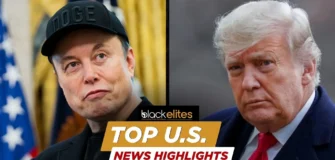It Started with a Backstab: The Trump–Musk Feud, Explained
Share

Tensions have escalated between US President Donald Trump and tech mogul Elon Musk, signaling the end of their once amicable relationship.
For over a week, Musk has been criticising Trump’s primary legislative initiative, a spending bill, while actively campaigning against it.
On Thursday, during a meeting with the German leader in the Oval Office, Trump openly expressed his discontent with Musk.
In retaliation, Musk unleashed a series of remarkable criticisms on X, insinuating without proof that Trump is featured in unreleased documents associated with the late sex offender Jeffrey Epstein.
Trump responded multiple times, accusing Musk of having “gone CRAZY” and stating that he was asked to exit the administration. He also warned of potentially severing government contracts with Musk’s companies.
Phase One: Shared Interests
The relationship between Trump and Musk was not always antagonistic. In reality, Musk was one of Trump’s prominent supporters during the 2024 U.S. presidential race.
He reportedly contributed more than $250 million to Trump’s campaign and accepted a federal role to head the Department of Government Efficiency (DOGE), indicating a convergence of their business motives and political beliefs.
Musk likely regarded Trump as a valuable disruptor, someone capable of deregulating sectors, challenging established institutions, and advocating for American ingenuity.
Conversely, Trump saw Musk as a testament to his appeal among Silicon Valley and the elite of the free market. However, history demonstrates that alliances founded on shared interests can often falter due to diverging objectives.
The Breaking Point: “One Big Beautiful Bill”
The relationship began to deteriorate with Trump’s flagship legislative initiative: the “One Big Beautiful Bill Act.” This proposed:
- Significant tax reductions for the affluent
- Decreased funding for Medicaid
- An increase in the budget for the border wall
- And most critically, the removal of subsidies for electric vehicles (EVs)
This final aspect struck a nerve with Musk. As Tesla’s CEO, his company depended heavily on governmental EV incentives and supportive clean energy policies, making the bill a significant threat rather than a benefit.
Musk publicly criticized the bill, labeling it a “disgusting abomination” and accusing Trump of betrayal.
Trump retaliated, suggesting Musk’s outrage was merely a sulk over “losing his subsidies.” However, the feud had already progressed from a policy dispute to a battle of egos.
The Insults Started Here
What ensued was an unabashed exchange of insults:
Musk called for Trump’s impeachment, claiming he had connections to Jeffrey Epstein—a statement that, while unverified, sparked massive reactions on social media.
Trump labeled Musk “ungrateful,” “crazy,” and accused him of suffering from Trump Derangement Syndrome.
Musk retorted, cautioning that Trump posed a threat to “American innovation and national unity.”
This situation was more than a disagreement, it was a struggle for dominance. Trump had shaped his post-presidency narrative around commanding the Republican base.
Musk, on the other hand, was positioning himself as a centrist dissenter, free from party allegiance and able to sway both culture and markets.
Who Has More at Stake?
Elon Musk
Musk’s conglomerate, comprising Tesla, SpaceX, Starlink, and X (formerly Twitter), is significantly dependent on government contracts and regulatory goodwill.
His provocations may resonate with his supporters, but openly opposing a sitting president risks jeopardizing his access to federal support and protection.
Trump has already threatened to withdraw Musk’s federal contracts. Tesla’s stock has fallen over 14% since the conflict intensified, resulting in a loss of more than $150 billion in market value. Investors are anxious. Political disputes generally harm business.
Donald Trump
Trump risks disenfranchising one of the few influential tech figures who once supported him. For someone aiming to rehabilitate his image as a business-friendly disruptor, severing ties with Musk diminishes his credibility.
It also creates opportunities for emerging political movements that Musk could fund or lead.


















